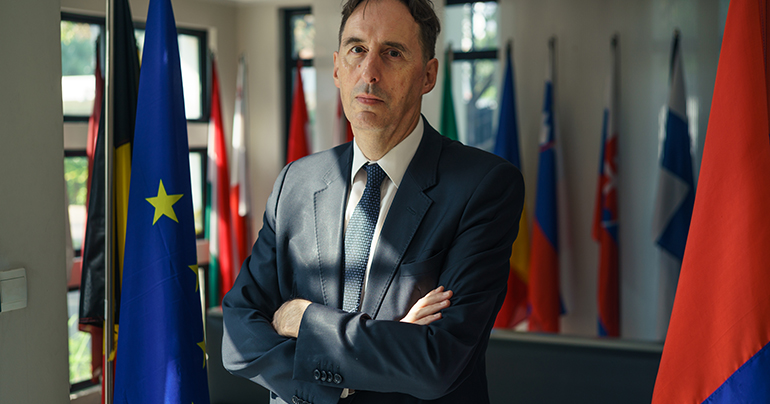In the build up to this year’s election in Cambodia, European Union ambassador George Edgar discusses the country’s close partnership with Europe, democracy, and the role of China

Cambodia has come under heavy criticism over its clampdown on political opposition and dissent, and some of its development partners have suspended aid. As preparations for this year’s national elections continue, the European Union ambassador to Cambodia, George Edgar, says that such votes must be inclusive enough to ensure there can be no doubt of their legitimacy.
***
Prime Minister Hun Sen seems happy to continue clamping down safe in the knowledge that he has the support of China and can do without the EU. How do you respond to that?
The European Union has been a close partner for Cambodia for many years. Access to European markets under the Everything But Arms scheme has been a significant driver of Cambodia’s impressive economic growth. More than 40% of Cambodia’s exports go to the EU, and the EU and the US together receive around 65% of the country’s exports… China has played an important role in Cambodia in recent years in the development of infrastructure, and it is Cambodia’s biggest investor and biggest source of imports. Many of those imports go into production of goods exported to the EU and elsewhere. There isn’t a competition between the EU and China, and Cambodia isn’t obliged to choose one or the other. It should be able to have mutually beneficial relations with a range of partners.
The EU has suspended its support to the NEC, which will oversee the conduct of the election. Isn’t this move making the situation even worse?
No. I have high confidence that from a technical point of view the NEC will be able to run a good election, but a legitimate election process needs to be inclusive since the point of it is to enable the people to choose who they wish to represent them in parliament. In that context, the exclusion of a party that had the support of more than 40% of voters in the last two elections is clearly a big problem.
How do you respond to those who say that democratic governance in any country evolves and can’t be successfully imposed by pressure from outsiders?
I agree that democracy cannot be imposed by pressure from outside. But it can be supported, and that is one of the things we have consistently tried to do in Cambodia as elsewhere.
The government accuses the opposition of being involved in a United States-backed plot to overthrow the Cambodian People’s Party and Prime Minister Hun Sen. How credible is this?
Every opposition party wants to replace the party in power. The purpose of a democratic system is to let the people decide who will govern, and the best way to ensure that this happens in an orderly, peaceful way is to hold elections that are inclusive enough and transparent enough that there can be no doubt of the legitimacy of the outcome.
This article was published in the February edition of Southeast Asia Globe magazine. For full access, subscribe here.

